For those of you who might have missed these articles by the great Peter Filicia. Here is the true story that inspired the musical work in progress I keep talking about here...The Road to Qatar! This will give you some background on what an amazing tale it is.
Something To Aspire To
By: Peter Filichia
"We want you to write musical. How much?" That was the cryptic e-mail that bookwriter-lyricist Stephen Cole received last February. It was followed by an instruction to call a number in -- of all places -- Dubai. Cole assumed it was "just one of those e-mails," but he wrote back, saying he wouldn't call Dubai and that the sender would just have to call him. "A second later," Cole says, "the phone rang and a broken-English voice asked if I'd write a musical for the Emir of Qatar."
Although Cole has written musicals produced regionally (Casper) and off-Broadway (After the Fair), he hasn't yet reached Broadway, so he was surprised to be summoned. The Dubainians told him that his website had gotten them interested in him. So, would he write an original musical? Says Cole, "I'd read how rich this country was, so I told my agent to ask for a lot of money. They came back with an offer of only a work-for-hire contract but with enough money to make me say, 'Take it!' " But Cole would have to accept their choice of composer. "I suggested ones I'd worked with, but they nixed them all," he relates. "None, you see, had a website. They told me David Krane would compose, and while I'd only barely met him, I knew I'd be dealing with someone who knew musicals."
Indeed, Krane -- who was equally stunned when he got his e-mail from Dubai -- has been writing Broadway dance music and/or arrangements since Carmelina in 1979. "Even though I haven't written a musical for Broadway," he says, "they were sold when they saw on my website that I worked on the Chicago movie." (Moral of the story, writers: Get a good website!) "They didn't offer enough money for a Rolls-Royce, but enough for a mini one," says Krane. "So I said yes."
Fine. But now he and Cole were told they had to deliver the show in eight weeks. The collaborators asked "What's the show about?" and were told they'd learn more after they flew to Dubai. After a 14-hour business-class flight, they met their producers. The first surprise was that the musical would be performed in English "because most of the audience would be foreign dignitaries," says Krane. "And the Emir spoke English, too."
Artistic director Nasser Abdullah Abdul Reda told them that the show would deal with a boy whose father would not let him go to a sports academy. Says Krane, "The show would open Qatar's newest sports arena -- the world's largest soccer stadium -- at the Aspire Sports Academy." Cole decided that he had his title: Aspire. "I was told, though," he says, "that the show had to include such Qatarian icons as the sea, ancient Greece, ancient Qatar, a pearl diving expedition and -- oh, yes -- Carl Lewis, the Olympic runner, and Zinedine Zidane, a French soccer star. I came to the conclusion that they had to be included because the Emir hoped they'd actually show up for the premiere. What's worse, I was expected to have an outline by the end of that first day! They even had set designers there from England, so they could get started working from my outline." (Those designers would eventually quit.)
By the second day, Cole had decided that the show's theme should be what one needed besides strength to be a good sportsman. "So," he says, "I landed on a sultan's son who goes on a tantrum in his room and learns a lesson when a star comes to life. The producers wanted a narrator, but I sold them on the star being personified as a Bette Midler-type. She teaches the boy wisdom, compassion, and courage. The Wizard of Oz always works," Cole adds with a knowing smile. Krane was able to hire crackerjack orchestrator Larry Blank and a music copyist. Cole and Krane then flew to Doha -- Qatar's capital -- to see the still-under-construction stadium, in which the show would premiere on November 19. "Then they took us on a wild SUV ride through the pitch black desert at what had to be 100 miles an hour," says Krane. "We arrived in an encampment where there was a belly dancer, and then we went on camel rides. We felt like we were in The Road to Morocco."
They got their advance. Krane also got a tape of Qatarian folk tunes, some of which would have to be assimilated into the show. ("People would expect to hear them," he was told.) Then Krane and Cole returned home to write, although the contract now said six weeks, not eight. The shortened time frame particularly worried Cole because he'd been working on Marni Nixon's memoir -- fetchingly titled Audrey Hepburn Dubbed My Face -- and it was soon due at the publishers. But Krane and Cole proved the adage that work takes as long as the time you have to do it. They finished Aspire, including the dance music and underscoring, in five weeks.
In July, they went to London to perform it for their producers. "Luckily," says Krane, "Stephen has a fabulous voice. He's the love child of Stephen Douglass and Ethel Merman." Be that as it may, once Cole finished singing and Krane ceased playing, the stone-faced Arabs didn't applaud. Says Cole, "Though I'd spent 90 minutes singing my heart out, I decided that the check's clearing was my applause."
Actually, Reda and his people were thinking where the collaborators had erred culturally. For example, it turned out that one of the Qatarian folk tunes used by Krane can only be played at Ramadan. Out it went. But the show got a green light. This meant that Krane quickly had to go to Bratislava, of all places, to oversee the pre-recording of the music by a a 70 piece-orchestra. "I had put in a chime but was told to take it out because it sounded so much like the bell that tells Muslims it's time to pray," he says.
Krane and Cole were astonished when they were told that they "wouldn't be needed" at casting sessions or rehearsals. They returned to America and waited until they were summoned to Qatar. We'll learn of that trip in my next column.
********************
[To contact Peter Filichia directly, e-mail him at pfilichia@theatermania.com]
http://www.theatermania.com/content/news.cfm/story/7577
Peter Filichia's Diary Feb 1, 2006
We Open in Doha
By: Peter Filichia
When we last left bookwriter-lyricist Stephen Cole and composer David Krane, they'd been commissioned to write an original musical for the Emir of Qatar. As I related on Monday, they were given six weeks to do it and miraculously accomplished the task in five. Their show, Aspire, was to open a new soccer stadium in Doha, Qatar's capital, on November 19, 2005.
Much has been made of Elton John not being on the scene to work on his musicals. Well, much to the surprise of Cole and Krane, they weren't weren't invited to stay in Qatar for casting or rehearsals. But they were summoned to the Middle Eastern country two days before the opening, so they could watch the final rehearsals on Friday and Saturday. What they saw was a bit of chaos. An LED screen on which projections were to be shown didn't work. (It had been shipped to Quatar at a cost of $95,000!) At each of the final rehearsals, the show never progressed past the third number. So Aspire, with its 175-member cast, would have to open without a full run-through or even a tech rehearsal.
Opening night! It's opening night! It's those Americans' latest show; will it flop or will it go? Before Krane and Cole started dressing for the occasion, they were told that they should take curtain calls, but they wondered, "What if the audience doesn't like it?" The show's stakes had been raised, for what had been conceived as a one-night-only performance had turned into a one-week run. Krane and Cole wondered if there'd be enough interest in Aspire for it to play out the week. Granted, the Emir was charging no admission for his subjects to see the show, but maybe it would be such a disaster no one would want to attend.
As the clock reached show time, something else was missing: The Emir. "Of course," says Krane, "we couldn't start before he got there." The collaborators killed time by chatting with the French and Korean ambassadors. They also scanned the crowd for Carl Lewis and Zinedine Zidane, the sports stars whom they were told to reference in their show. They weren't in attendance, as had been assumed; but Mark Spitz, another former Olympic champion, was.
Finally, a full hour late, in walked the corpulent Emir with his trophy wife. They took front row seats, and it was Magic Time. "It really was," says Cole. "I'd expected abstract sets, but oh, were these realistic. They'd been made in China and were bigger than you'd ever dream. The inside of tombs! King Tut's palace! Three enormous ships! And the cast! There were fire eaters, Croatian acrobats, Russian dancers, and jugglers who juggled things the size of houses. Funny, whenever we asked about the budget, they never told us what it was. They'd always say, 'Less than you think.' But this show sure looked expensive to us. It was like Jumbo, but bigger."
To their delight, the authors saw that the show itself worked. They sat back and enjoyed their tale of Mansour, the son of a Sultan. Since the death of the lad's mother, the Sultan won't let his 12-year-old leave the palace. Mansour is spoiled by his father's lackeys. When they say, "Your wish is our command," he snarkily decides, "I want that star in the sky to come down." Of course, they can't do that, but a Star does come down -- think Bette Midler -- to tell him off for being such a brat. Then she says, "Close your eyes and wish." Soon, Mansour is crossing the sea. He arrives in Greece, where he meets Odysseus, Achilles, Ajax, Agamemnon -- and a Cyclops, whom the Greeks want to kill. Mansour asks them to spare the monster and invites him to dinner. The charmed Cyclops says that he could never eat them now that they're all friends. The Greeks learn, "A man can win a battle by using his heart."
Mansour then takes off on a flying carpet, arrives in Egypt, and meets a nine-year-old named Tut who's been thrust, not unlike Chulalongkorn in The King and I, onto the throne after his father dies. The boy king is scared and runs away, which thrills General Horemheb and henchman Ay, who expect to take over Egypt. The country's laws demand a 30-day waiting period before power changes hands; Mansour spends the time encouraging Tut to reclaim the throne and planning a ruse to quash the villains. It works, and Tut is forever grateful. Mansour then meets the aforementioned Olympic champ Carl Lewis and soccer legend Zinedine Zidane, both of whom encourage him to take a camel ride. He winds up in 1920, where a pearl diving expedition is about to take place.
Then came a showstopper -- "though not the kind you'd want," says Cole. "Right then and there was a sword dance, and then 25 minutes of Arabian music with nothing happening dramatically. We just had to sit and wait it out." (The Emir's emissaries had insisted on all this, and Cole and Krane couldn't fight City Hall, so to speak.) Eventually, the story resumed with Mansour meeting Saad, a 15-year-old who gets stuck in a small underwater crevice. Only the diminutive Mansour can get into the space to help release him. In doing so, he helps Saad to become a man.
Once the Sultan sees how Mansour has matured, he allows him to leave the palace and become a man. But Krane and Cole didn't see the end of the show. They had to get ready for their curtain calls and, considering that the stadium was so large, they needed 10 minutes to go from their seats to the backstage area. When they bowed, the Emir stood up and cheered -- and, needless to say, so did everyone else. David Krane and Stephen Cole felt just like Mansour, whose name is Arabic for "victorious."
********************
[To contact Peter Filichia directly, e-mail him at pfilichia@theatermania.com]
Wednesday, March 21, 2007
Subscribe to:
Post Comments (Atom)

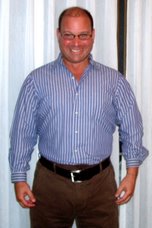








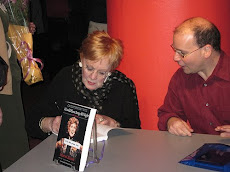

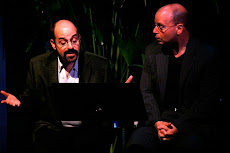
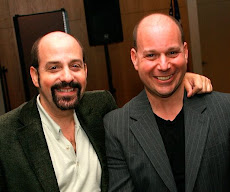





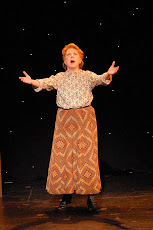

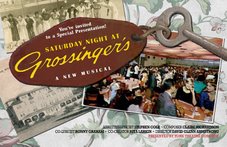
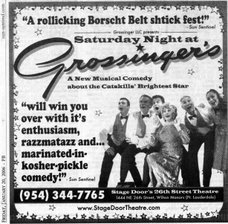

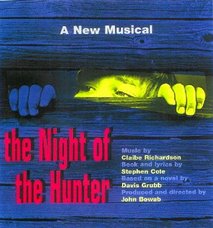
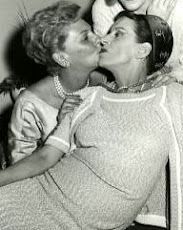
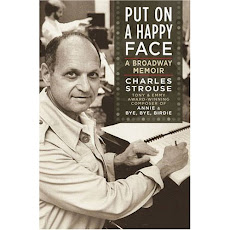

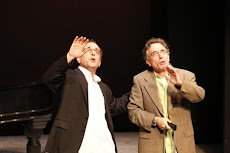
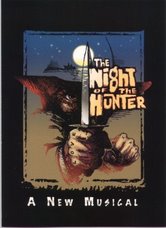
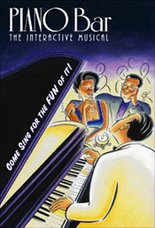

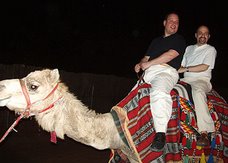
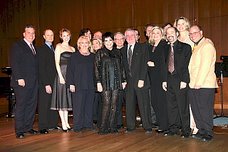
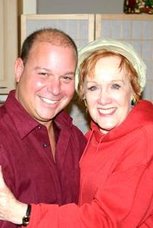
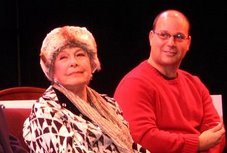
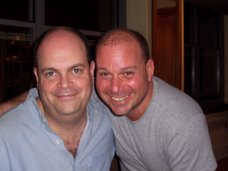
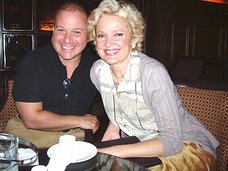
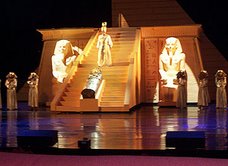
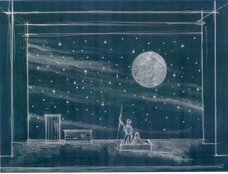
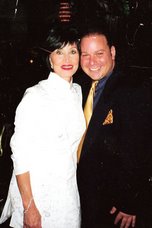

No comments:
Post a Comment